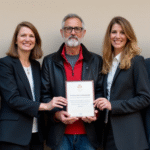Introduction
In Latin America, discussing wealth is synonymous with family stories. It’s about generations that have built their fortune with foresight, resilience, and hard work. However, these families now face a crucial moment: for the first time, the volume of capital that will change hands in the coming decades surpasses any previous record.
According to the UBS Global Wealth Report 2025, the world is facing the largest wealth transfer in history: nearly $83 trillion will pass from one generation to another over the next 20 to 25 years. Countries like Mexico are at the heart of this phenomenon.
Local Context and Wealth Distribution
The local context also reveals significant transformations. Although average wealth per adult in Mexico has shown a decline in recent years, the median wealth grew by 12.6% in 2024 alone and nearly 17% since 2020, indicating a strengthening of middle-tier wealth segments. Moreover, over 64% of the wealth in the country is concentrated in non-financial assets, such as real estate, adding a unique dimension to succession planning.
Challenges and Opportunities
Strategic Challenge: Without proper planning, even well-established fortunes risk fragmentation. Having appropriate legal and tax structures is no longer enough; a holistic vision that anticipates the future and actively involves the next generation is now essential. Delaying this process can jeopardize decades of hard work and quickly undo what took years to build.
Emotional Challenge: Some families still avoid discussing succession, roles, or expectations. However, silence does not ensure continuity; rather, a lack of preparation can create internal tensions and hasty decisions. Preparing heirs involves teaching them investment skills and helping them understand the purpose of that capital, its potential impact, and the leadership role they are expected to play within the family legacy.
Cultural Challenge: Newer generations view wealth differently. They seek greater participation, transparency, and meaning. They are interested in social impact, sustainability, and causes that transcend profitability. This scenario should be seen as an opportunity to strengthen the identity of the family fortune and better connect it with the modern world.
A New Legacy Model
At this historical juncture, Latin America has the chance to construct a new legacy model. One that combines the experience of those who created the fortune with the energy and vision of those who will inherit it. A model that transforms wealth into a tool for purpose, continuity, and progress.
In this context, wealth advising should facilitate processes, build trust, and offer a comprehensive perspective to guide families on their journey.
Key Questions and Answers
- Q: Why is this wealth transfer significant in Latin America? A: This transfer represents the largest in history, with nearly $83 trillion changing hands over 20 to 25 years. Countries like Mexico are central to this phenomenon.
- Q: How is wealth distributed in Latin America? A: While average wealth per adult has declined, median wealth has grown. Over 64% of wealth is in non-financial assets, such as real estate.
- Q: What challenges do families face during this wealth transfer? A: Families must address strategic, emotional, and cultural challenges. These include proper planning, open communication, and adapting to newer generations’ perspectives on wealth.
- Q: What opportunities does this wealth transfer present? A: It offers a chance to redefine the purpose of wealth, strengthen family identity, and create a new legacy model that combines experience with vision.






